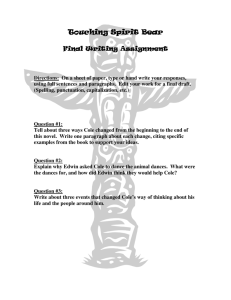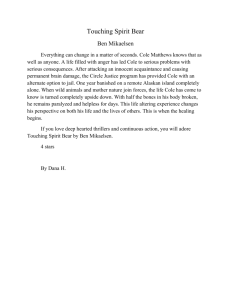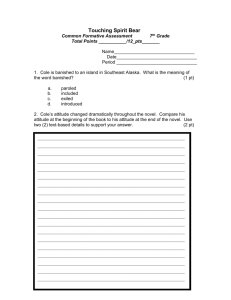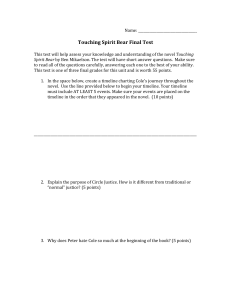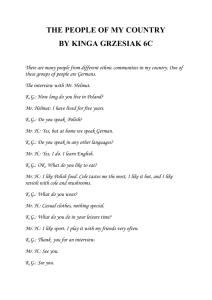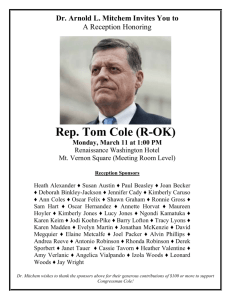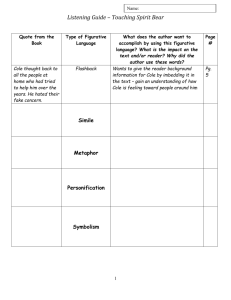The Evening Hour By Carter Sickels These discussion questions are
advertisement
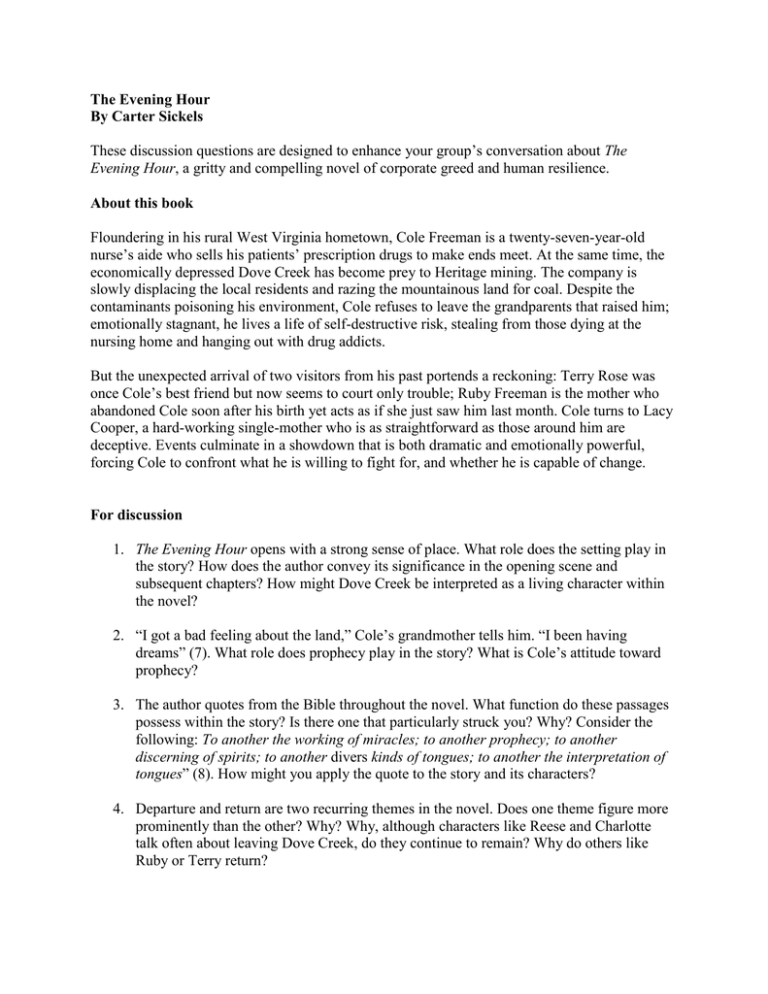
The Evening Hour By Carter Sickels These discussion questions are designed to enhance your group’s conversation about The Evening Hour, a gritty and compelling novel of corporate greed and human resilience. About this book Floundering in his rural West Virginia hometown, Cole Freeman is a twenty-seven-year-old nurse’s aide who sells his patients’ prescription drugs to make ends meet. At the same time, the economically depressed Dove Creek has become prey to Heritage mining. The company is slowly displacing the local residents and razing the mountainous land for coal. Despite the contaminants poisoning his environment, Cole refuses to leave the grandparents that raised him; emotionally stagnant, he lives a life of self-destructive risk, stealing from those dying at the nursing home and hanging out with drug addicts. But the unexpected arrival of two visitors from his past portends a reckoning: Terry Rose was once Cole’s best friend but now seems to court only trouble; Ruby Freeman is the mother who abandoned Cole soon after his birth yet acts as if she just saw him last month. Cole turns to Lacy Cooper, a hard-working single-mother who is as straightforward as those around him are deceptive. Events culminate in a showdown that is both dramatic and emotionally powerful, forcing Cole to confront what he is willing to fight for, and whether he is capable of change. For discussion 1. The Evening Hour opens with a strong sense of place. What role does the setting play in the story? How does the author convey its significance in the opening scene and subsequent chapters? How might Dove Creek be interpreted as a living character within the novel? 2. “I got a bad feeling about the land,” Cole’s grandmother tells him. “I been having dreams” (7). What role does prophecy play in the story? What is Cole’s attitude toward prophecy? 3. The author quotes from the Bible throughout the novel. What function do these passages possess within the story? Is there one that particularly struck you? Why? Consider the following: To another the working of miracles; to another prophecy; to another discerning of spirits; to another divers kinds of tongues; to another the interpretation of tongues” (8). How might you apply the quote to the story and its characters? 4. Departure and return are two recurring themes in the novel. Does one theme figure more prominently than the other? Why? Why, although characters like Reese and Charlotte talk often about leaving Dove Creek, do they continue to remain? Why do others like Ruby or Terry return? 5. Cole’s grandfather Clyde is a powerful figure in the book. How do Clyde’s views affect people, both positively and negatively? How are Cole’s spiritual beliefs influenced by his grandfather? Does Cole modify his beliefs as the story progresses? How are his spiritual views reflected in his behavior? 6. Why do you think Cole is drawn to Charlotte, Terry, Lacy, and Reese? What does each of these people represent for him? Is there an erotic component to each of these relationships? Why or why not? 7. What is Cole’s reaction when he first sees his mother after seventeen years? What is her response? Did either of their reactions surprise you? How does their relationship change as she remains in Dove Creek? 8. Reese tells Cole that they are similar: “Both of us are orphans” (135). Are there any other “orphans” in the story? How is the theme of orphanhood reflected throughout the novel? 9. Ariel Webb says: “Now Cole, if you want to be somebody, you got to get an education. I didn’t have the support of my family when I went off to teacher’s college. But it gave me a freedom I never would have had otherwise” (147). What does she mean by this? Does she retain a kind of freedom even though she returns to Dove Creek? 10. At one point, Cole wonders “if men like himself and Reese and Terry Rose could ever turn over a new leaf. His grandfather used to preach that a person could only be saved if he gave up everything and forgot his past: he had to die in order to be born again” (158). Does Cole, Reese, or Terry “turn over a new leaf”? Are any of the characters able to forget the past? Is such a thing possible? How might the grandfather’s statement about death and rebirth be understood metaphorically, particularly in regards to the novel’s overarching theme of “starting over”? 11. After learning of a doctor’s arrest, Leona Truman tells Cole, “I believe that it’s none of the government’s business what I do, but I don’t want to be doing nothing wrong . . . I ain’t done nothing wrong, have I?” (184) How would you respond to her question? Who, if anyone, is to blame for the underground drug economy involving Cole and senior citizens like Leona? 12. Consider the following passage: “It was an old story: a person went off to the big city, what his granddaddy called the devil’s playground, lived a life of sin, and then came home to repent. But Cole lost his way here in Dove Creek, at his grandfather’s side. He lost God among the mountains and the blue sky and the honeysuckle” (209). Where else in the novel does this city/country divide play out? How does the journalist Michael Brody amplify and undermine this distinction? How might you reconcile the above quote with Cole’s bias against Michael? Are there other factors that cause Cole to be wary of Michael? 13. After the disaster, the VP of Heritage is described as addressing local residents with “words like community, restoration, and reclamation” but the “crowd was not impressed”; listening to the executive’s speech, they remain haunted by memories of their dying neighbors, “hanging from trees,” “black poison dribbling out of mouths” (251–252). How do these two seemingly disparate images come together? Could the last image serve as a commentary on the first? What does the scene reveal about politics and the corruption of language? 14. Think about Cole and Terry’s last meeting at the creek. Did it turn out differently than you expected? How? How would you interpret what transpired between them? Could it be understood as some kind of reconciliation? Why or why not? 15. Where does the novel leave Cole at the end? Has he gotten away with his crimes? Why or why not? Is Cole finally “free”? Suggested reading Daniel Woodrell, Winter's Bone; Adam Johnson, The Orphan Master's Son; Alexander Maksik, You Deserve Nothing; Sere Prince Halverson, The Underside of Joy; Frank Bill, Crimes in Southern Indiana: Stories; Bonnie Jo Campbell, American Salvage; Donald Ray Pollock, The Devil All The Time; Denis Johnson, Train Dreams; Tom Franklin, Crooked Letter, Crooked Letter; Philip Meyer, American Rust; Dorothy Allison, Bastard Out of Carolina; Jim Grimsley, Dream Boy. Carter Sickels, a graduate of the M.F.A. program at Pennsylvania State University, was awarded scholarships and residencies to Bread Loaf Writers’ Conference, the Sewanee Writers’ Conference, the MacDowell Colony, VCCA, the Djerassi Residency, and Fundación Valparaíso. After spending nearly a decade in New York, Carter left the city to earn a master’s degree in folklore at the University of North Carolina at Chapel Hill and is now living in the Pacific Northwest.
